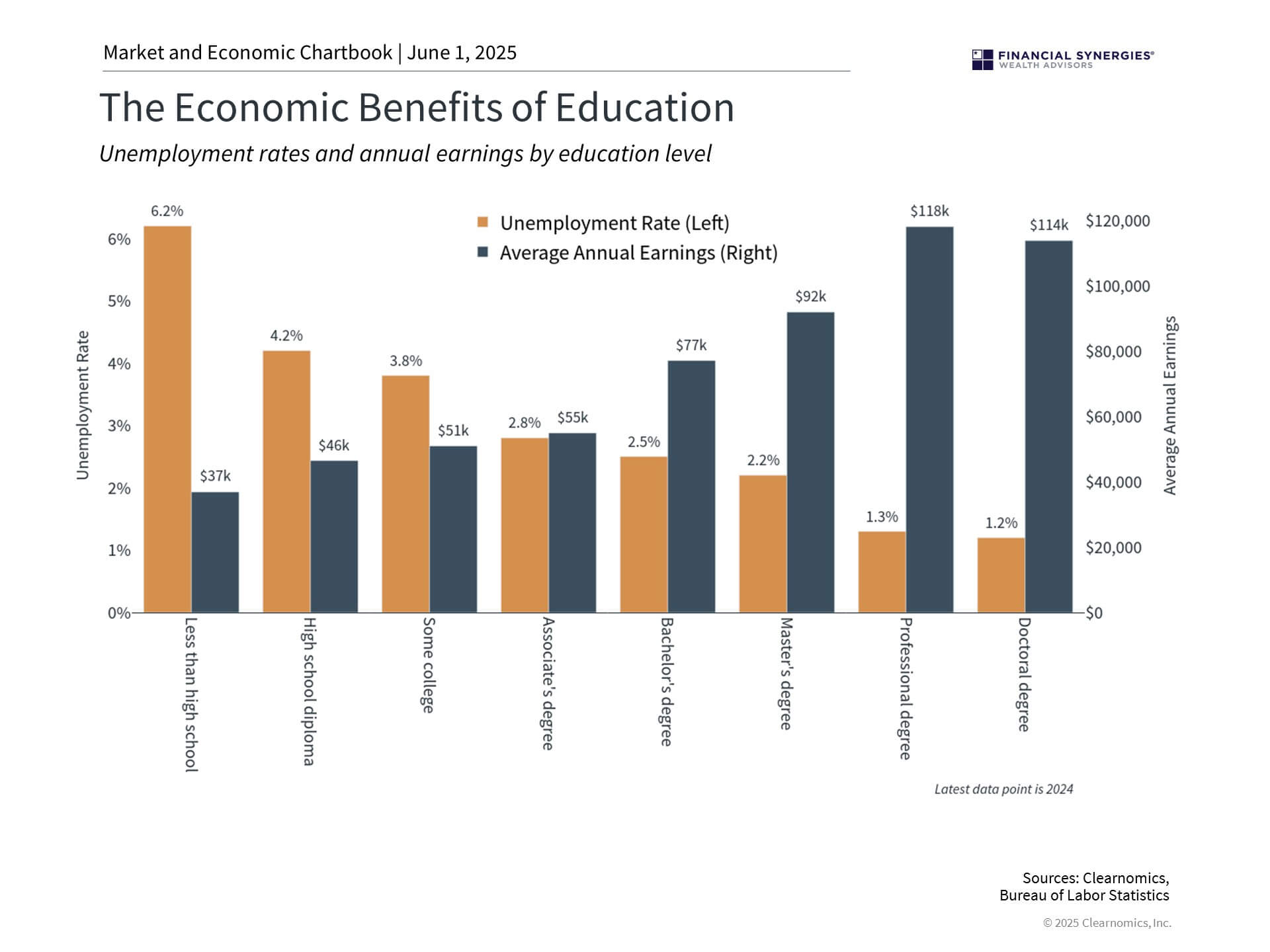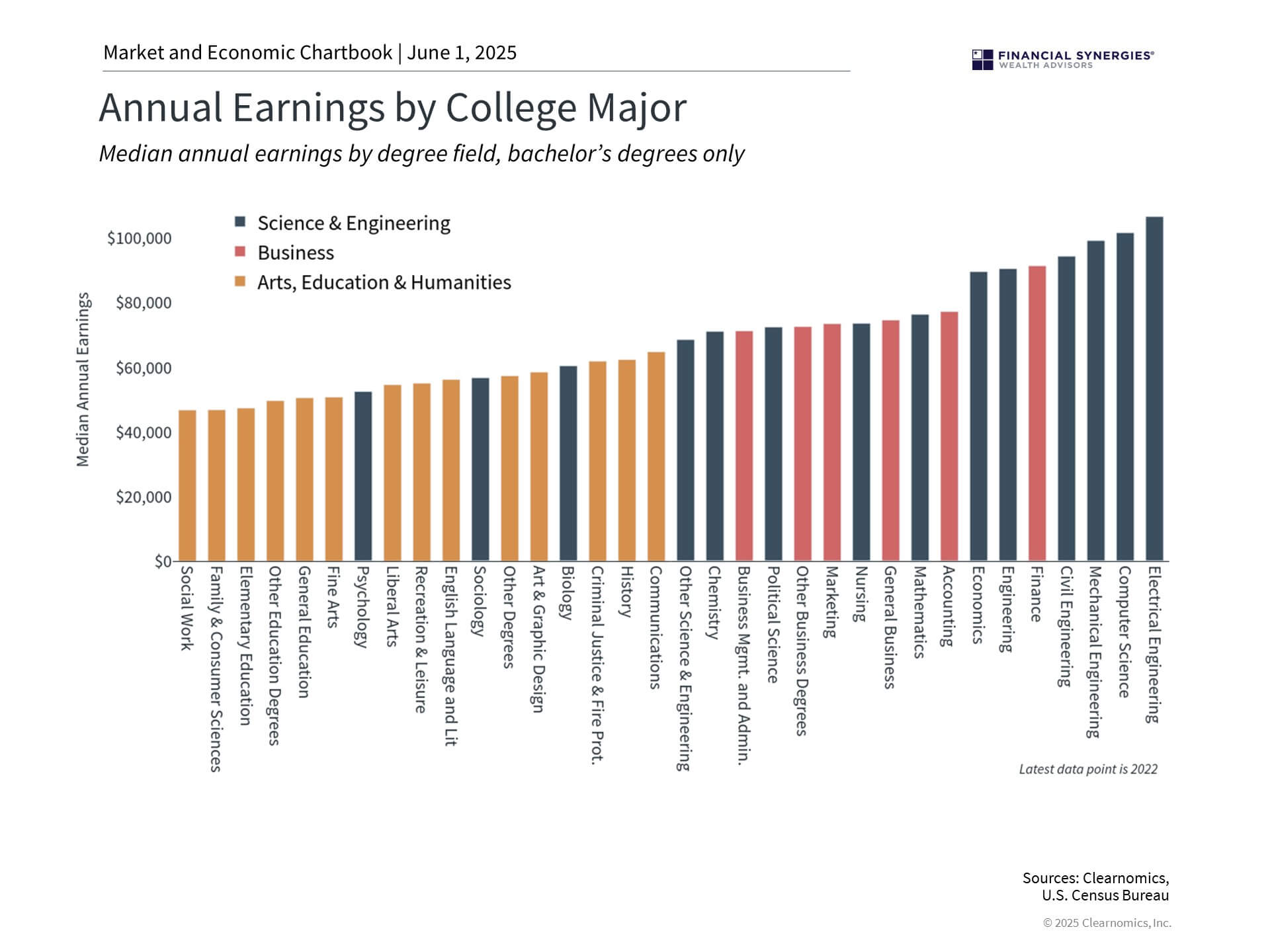- June 12, 2025
- Mike Minter

Benjamin Franklin once said that “an investment in knowledge pays the best interest.” As many high school seniors prepare to make their final college decisions, families face one of the most significant financial commitments of their lives.
The investment in higher education represents not only substantial costs but also a complex decision about future career prospects, quality of life, and financial independence. With proper planning and perspective, families can navigate these decisions strategically, balancing immediate costs against long-term benefits.
When making education decisions, it’s important to distinguish between the cost of attending college and the value it provides. There is no doubt that tuition and other expenses have risen dramatically. However, there is strong evidence that higher education still offers significant lifetime benefits. Since these returns can vary greatly depending on the choice of school and college major, careful thought and financial planning are needed.
Higher education still offers significant economic benefits

It’s well known that college costs have consistently outpaced inflation over the past 40 years. According to the College Board’s latest report, the average cost for the 2024-2025 academic year reached $58,600 annually for private four-year institutions and $24,920 for public universities for in-state students (both figures include room and board).
This rapid increase stems from multiple factors including reduced state funding for public universities, expanded campus amenities, increased administrative costs, and investments in technology infrastructure. The post-pandemic era has further accelerated these trends with investments in hybrid learning capabilities and enhanced campus health measures. In the current political climate, the cost of education also carries uncertainty related to government funding cuts.
Understanding these trends is essential for families at any stage of the college planning process, whether preparing for immediate enrollment or developing a long-term educational strategy. In general, starting earlier allows for more strategic saving and potentially reduces the need for student loans that can burden graduates for decades after completing their education.
One concern some students have is whether college is still worth the cost. While it can vary significantly, data consistently shows that higher education continues to provide significant economic advantages.
According to recently released data from the Bureau of Labor Statistics, the unemployment rate for those with a bachelor’s degree was just 2.5% in 2024, compared to 4.2% for those with only a high school diploma. Similarly, average annual earnings for college graduates reached $77,150, substantially higher than the $46,500 for high school graduates.
For those with master’s, professional, and doctoral degrees, the unemployment rate falls further and annual earnings are higher. These earnings differences compound over a lifetime as college graduates earn more throughout their careers.
Different majors can lead to significantly different outcomes

While these numbers are compelling, they don’t tell the complete story since outcomes can vary significantly based on field of study, institution attended, and how effectively students leverage their education into career opportunities.
When evaluating the financial return on education, the choice of major plays a crucial role. The accompanying chart shows median annual earnings for professionals between the ages of 25 and 64 with bachelor’s degrees. STEM fields (Science, Technology, Engineering, and Mathematics) consistently demonstrate the strongest returns, with some fields showing median annual earnings exceeding $100,000. Engineering and computer science majors lead in earnings potential, while healthcare and business fields also show strong returns.
By contrast, fields in the humanities and education typically offer lower median earnings. Of course, there are many benefits to higher education beyond monetary earnings, and there are many paths that graduates can take with these degrees. So, these numbers don’t diminish the importance of these fields but instead highlight the need for careful financial planning when pursuing these paths.
Alternative educational paths deserve serious consideration as well. Technical certifications, associate degrees, and apprenticeship programs can offer focused skill development at lower costs, sometimes with employment outcomes comparable to or exceeding some four-year degrees. These options may represent pragmatic alternatives for certain students or complement traditional degree programs.
And let’s face it, for some, a four-year traditional college education simply isn’t worth the expense.

Education vehicles and strategies offer planning flexibility
Ideally, creating a plan to pay for college occurs long before you know what kind of education your child, grandchild, or other family member will be interested in. But even for those near college acceptance, taking advantage of the right vehicles and strategies can help.
529 plans remain the foundation of most education funding strategies, offering tax-free growth and distributions for qualified education expenses. Recent legislative changes have enhanced their flexibility, allowing limited rollovers to retirement accounts and provisions for apprenticeship programs and student loan repayments. Many states also offer tax deductions or credits for contributions, enhancing their appeal.
UGMA/UTMA accounts, which stand for “Uniform Gifts/Transfers to Minors Act,” provide alternatives that allow for greater flexibility in how funds can eventually be used. While lacking the tax advantages of 529 plans, these vehicles allow greater flexibility in asset use while removing substantial assets from taxable estates.
For families with the means to do so, direct tuition payments to educational institutions can offer a powerful exception to gift tax limitations. This is because payments made directly to educational institutions for tuition expenses are exempt from gift taxes, regardless of the amount. This special provision in the tax code allows grandparents or other family members to contribute significantly to a loved one’s education without using any portion of their lifetime gift and estate tax exemption or annual gift tax exclusion.
Other approaches, such as customized trust structures, can help as well. For instance, education trusts give donors more control over how money is used for college costs. You can set up rules about grades, choice of schools, or even extend benefits to future generations. These trusts can also help reduce taxes while supporting your family’s education values.
It’s important to connect any college savings plan with your overall financial plan. Tax rules for education savings change over time, so staying up-to-date is critical. Working with a financial advisor can help you make the best choices for your family’s education goals in the current environment.
The bottom line? College planning requires balancing immediate costs against long-term benefits. By starting early and considering the most appropriate vehicles and strategies, families can make choices that support future educational and financial success.
Concerns or questions about your financial plan or tax strategy? Contact Financial Synergies today.
We are a boutique, financial advisory and total wealth management firm with over 35 years helping clients navigate turbulent markets. To learn more about our approach to investment management please reach out to us. One of our seasoned advisors would be happy to help you build a custom financial plan to help ensure you accomplish your financial goals and objectives. Schedule a conversation with us today.
More relevant articles by Financial Synergies:
- 2024 Important Tax Numbers: A Handy Guide
- Important Resources for Filing Your 2023 Tax Return
- Top Client Questions: Fed, Debt, Trump
Blog Disclosures
This content, which may contain security-related opinions and/or information, is provided for informational purposes only and should not be relied upon in any manner as professional advice, or an endorsement of any practices, products or services. There can be no guarantees or assurances that the views expressed here will be applicable for any particular facts or circumstances, and should not be relied upon in any manner. You should consult your own financial advisors as to legal, business, tax, and other related matters concerning any investment.
The commentary in this “post” (including any related blogs, videos, and social media) reflects the personal opinions, viewpoints, and analyses of the Financial Synergies Wealth Advisors, Inc. employees providing such comments, and should not be regarded as the views of Financial Synergies Wealth Advisors, Inc. or its respective affiliates or as a description of advisory services provided by Financial Synergies Wealth Advisors, Inc. or performance returns of any Financial Synergies Wealth Advisors, Inc. client.
Any opinions expressed herein do not constitute or imply endorsement, sponsorship, or recommendation by Financial Synergies Wealth Advisors, Inc. or its employees. The views reflected in the commentary are subject to change at any time without notice.
Nothing on this website or Blog constitutes investment or financial planning advice, performance data or any recommendation that any particular security, portfolio of securities, transaction or investment strategy is suitable for any specific person. It also should not be construed as an offer soliciting the purchase or sale of any security mentioned. Nor should it be construed as an offer to provide investment advisory services by Financial Synergies Wealth Advisors, Inc.
Any mention of a particular security and related performance data is not a recommendation to buy or sell that security. Financial Synergies Wealth Advisors, Inc. manages its clients’ accounts using a variety of investment techniques and strategies, which are not necessarily discussed in the commentary. Investments in securities involve the risk of loss. Past performance is no guarantee of future results.
Any charts provided here or on any related Financial Synergies Wealth Advisors, Inc. personnel content outlets are for informational purposes only, and should also not be relied upon when making any investment decision. Any indices referenced for comparison are unmanaged and cannot be invested into directly. As always please remember investing involves risk and possible loss of principal capital; please seek advice from a licensed professional. Any projections, estimates, forecasts, targets, prospects and/or opinions expressed in these materials are subject to change without notice and may differ or be contrary to opinions expressed by others. Information in charts have been obtained from third-party sources and data, and may include those from portfolio securities of funds managed by Financial Synergies Wealth Advisors, Inc. While taken from sources believed to be reliable, Financial Synergies Wealth Advisors, Inc. has not independently verified such information and makes no representations about the enduring accuracy of the information or its appropriateness for a given situation. All content speaks only as of the date indicated.
Financial Synergies Wealth Advisors, Inc. is a registered investment adviser. Advisory services are only offered to clients or prospective clients where Financial Synergies Wealth Advisors, Inc. and its representatives are properly licensed or exempt from licensure. Investments in securities involve the risk of loss. Past performance is no guarantee of future results.




